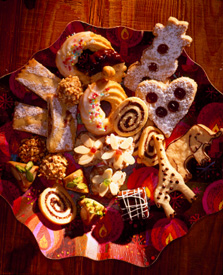Training and treats
My friend and colleague Lynn Loar is a social worker specializing in families at risk for child abuse. In one of her programs, she brings several families together weekly for an evening of clicker training, using naïve shelter dogs. The families also play the shaping game with each other—adults clicking and treating children, children clicking and treating grownups—during the course of the session.

On the table is a big bowl of treats for the dogs and another, much bigger bowl of wrapped candy of many different sorts, for the people. As part of learning to click, the families must also learn to give treats to the dogs and candies to the other people when they are playing the shaping game. Adults and children also earn clicks and candy from Lynn or her helpers. Lynn and her staff might click and treat a person who was previously talking or turning away, but is now watching the proceedings, or when they see a smile or an instant of warmth, such as an adult putting a candy into a child's hand instead of just tossing it.
"People have a history of deprivation," Lynn says. "We all feel deprived sometimes. For the adults in these families, it's hard to give anything away, even a smile or a touch, when they never got anything themselves. That big bowl of candy on the table is obviously FAR more than we need, far more than we're going to use. There is plenty. There is more than plenty. That bowl, there in the room, creates a climate of abundance, a climate in which it's all right to be generous to a child, to feel interest in a dog, to give treats away instead of hanging onto them. On the second week, the first thing they do when they come in the room is look to see if the bowl of candy is still there." And it always is. The very existence of that lavish supply creates a climate of abundance. By the sixth week, families leave the session holding hands, laughing, and chatting with each other. The whole style of interaction has been transformed for the better.
Undercurrent of stinginess
In spite of holidays, such as Christmas, which are given over to generosity and to quantities of presents, food, and drink, there's an undercurrent of frugality in our culture, almost of stinginess. It's the enemy of clicker training.
New clicker training students often seem to feel that giving a dog 50 or 60 treats in one 10-minute session is just plain wrong. It's evil. Once, about 20 years ago, I was giving a seminar in New England and there was a set of weave poles in the room. That night, I thought of how I might train weave poles by back-chaining. So, the next day I found a lively Jack Russell, ascertained that he had never been exposed to any agility training, had him crated for a couple of hours so he'd be hungry and restless, and brought him up on stage. I trained a behavior (now called the macaroni, I'm told), put it on cue, back-chained it, and in about 10 minutes had this little dog running the whole line of poles. Yay—that worked!
But to this day I can see the owner's sour face. She didn't care about her dog's success; she was disgusted by the number of treats he got, enough to make him sick, she was sure. (It didn't—I watched. It just made him very interested in weave poles.)
Start small, create a chain of plenty
Maybe we can create a climate of abundance, not by overeating, not by overspending, but by thinking it through. Small abundances can make that feeling happen. I've done it by dividing one bunch of flowers into three or four and putting little arrangements all over the place. Or by baking three pecan pies instead of one, and giving two away. Who learns about being free-handed with reinforcers, instead of fearful and stingy, by doing this? Not just the recipient. You.
Merry Christmas and happy clicking,
Karen Pryor



A Bun Dance
I love this whole idea of creating a greater feeling of abundance - having a small dog one of the things I do is cut up the pieces of food treats very small - she still counts it as a treat - maybe more so than a bit that's too big to eat straight away.
And I love the idea of extending the abundance to include the humans too.
I came over to say thank you. I'm delighted to discover you have a blog here. That's increased my sense of abundance too.
Ever since we played "You Don't Say" I've been really aware that there is absolutely no reason that my dog might understand my words/signals to mean what I think they mean... its increased my patience and my tolerance enormously - I blogged it here:
http://caroslines.blogspot.com/2008/10/crossed-wires.html
And thank you!
Post new comment